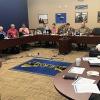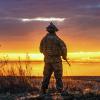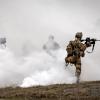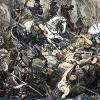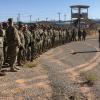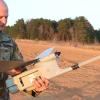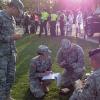George Bernard Shaw once said, “The single biggest problem in communication is the illusion that it has taken place.” At the heart of the U.S. Army Futures Command is a fundamentally new approach to revolutionizing communication across the Army’s modernization enterprise. The Army recognized that communication between scientists, concept developers, technologists and requirement writers was failing to keep pace with the speed and complexity of relevant technological developments needed to stay ahead of increasingly capable adversaries. Futures Command brought this intellectual capital into the...
George Bernard Shaw once said, “The single biggest problem in communication is the illusion that it has taken place.” At the heart of the U.S. Army Futures Command is a fundamentally new approach to revolutionizing communication across the Army’s modernization enterprise. The Army recognized that communication between scientists, concept developers, technologists and requirement writers was failing to keep pace with the speed and complexity of relevant technological developments needed to stay ahead of increasingly capable adversaries. Futures Command brought this intellectual capital into the...
George Bernard Shaw once said, “The single biggest problem in communication is the illusion that it has taken place.” At the heart of the U.S. Army Futures Command is a fundamentally new approach to revolutionizing communication across the Army’s modernization enterprise. The Army recognized that communication between scientists, concept developers, technologists and requirement writers was failing to keep pace with the speed and complexity of relevant technological developments needed to stay ahead of increasingly capable adversaries. Futures Command brought this intellectual capital into the...
Last summer, we traveled to India with a team of West Point faculty and cadets to study the 2008 Mumbai terrorist attacks. Those attacks revealed lessons about the challenges of urban warfare. They also highlighted—as we learned during our two weeks there conducting dozens of interviews, site visits and detailed research—a number of lessons about the use of proxies in the 21st century. Combined with lessons we also learned during a similar cadet and faculty research trip to Ukraine the year before, our research yielded important conclusions that should inform the way the U.S. Army...
Last summer, we traveled to India with a team of West Point faculty and cadets to study the 2008 Mumbai terrorist attacks. Those attacks revealed lessons about the challenges of urban warfare. They also highlighted—as we learned during our two weeks there conducting dozens of interviews, site visits and detailed research—a number of lessons about the use of proxies in the 21st century. Combined with lessons we also learned during a similar cadet and faculty research trip to Ukraine the year before, our research yielded important conclusions that should inform the way the U.S. Army...
Many fundamentals of military leadership can be applied to ensure that soldiers, families and other members of the military community remain resilient in the face of psychological threats associated with the coronavirus pandemic. The importance of psychological resilience was recognized as far back as the 5th century B.C., with Sun Tzu’s recognition that wars are won by robbing an army of its spirit and depriving the commander of his courage. More recently, military strategist and author Lidell Hart wrote, “While fighting is a physical act, its direction is a mental process.”
Just as mental...
Many fundamentals of military leadership can be applied to ensure that soldiers, families and other members of the military community remain resilient in the face of psychological threats associated with the coronavirus pandemic. The importance of psychological resilience was recognized as far back as the 5th century B.C., with Sun Tzu’s recognition that wars are won by robbing an army of its spirit and depriving the commander of his courage. More recently, military strategist and author Lidell Hart wrote, “While fighting is a physical act, its direction is a mental process.”
Just as mental...
Many fundamentals of military leadership can be applied to ensure that soldiers, families and other members of the military community remain resilient in the face of psychological threats associated with the coronavirus pandemic. The importance of psychological resilience was recognized as far back as the 5th century B.C., with Sun Tzu’s recognition that wars are won by robbing an army of its spirit and depriving the commander of his courage. More recently, military strategist and author Lidell Hart wrote, “While fighting is a physical act, its direction is a mental process.”
Just as mental...
Anyone who has worked directly for a battalion commander or above probably has experience writing “ghost notes.” These are emails a subordinate writes and addresses for their boss to send to other people. Ghost notes can be weekly or monthly sitreps, updates on an ongoing situation or emails asking for additional resources. No matter the type, they are the “easy button” for the commander because all they have to do is hit “send.”
Recently, I worked for a senior Army leader who encouraged his subordinate commanders to own their communications—meaning, write their own emails. As I reflected on...
War and the use of force have revealed significant shifts over the past several decades. The importance of acknowledging and understanding these shifts is far from merely an academic issue for our political and military leaders.
As Eliot Cohen and John Gooch point out in their book Military Misfortunes: The Anatomy of Failure in War, some failures can be catastrophic. Think of France in 1940 and the collapse of the French army. This disaster resulted from a combination of failures to anticipate, learn and adapt. The French, the authors write, “built up a picture of what a future war would and...
Ambushed by Combat’s Personal Complexities
Just Another Day in Vietnam. Col. (Ret.) Keith Nightingale. Casemate Publishers. 264 pages. $34.95
By Lt. Gen. James Dubik, U.S. Army retired
Just Another Day in Vietnam takes the reader into battle—emotionally, psychologically, morally, physically and existentially. Doing so makes it a valuable read. There’s a lot to learn from this book: for the military professional; for citizens who send their brothers and sisters, sons and daughters, husbands and wives to fight on their behalf; and for senior civil and military leaders whose responsibility is to use...
As the events of fall 2013 unfolded in Ukraine and President Victor Yanukovych fled the country, Russia was thrust into a problematic position. The country could not afford to cede influence and control over a territory that was so critical to its very survival. As a result, Russia moved in swiftly, rekindling strategy and tactics reminiscent of the Soviet Union. As the world struggled to make sense of its actions, Russia unleashed a new concept for prosecuting war—new-generation warfare, also known as hybrid warfare.
This audacious move resulted in the invasion of a sovereign country, the...
Technological surprise in war occurs when one opponent fields and employs military capabilities that not only drastically exceed the expectations of their adversary but also potentially create a tactical or strategic advantage for subsequent exploitation. For 2nd Lt. Freeland Daubin Jr. of the 1st Regiment, 1st Armored Division, the risk of technological surprise manifested in combat against the German army in 1942 during the Battle of Happy Valley. It was a demoralizing and terrifying experience.
The Battle of Happy Valley was one of the early battles between American and German armored units...
Shortly after becoming a brigade commander, I was driving home at the end of a training day feeling self-satisfied with my new command. When I saw a rain-soaked soldier walking toward the train station, I stopped to pick him up.
As we rode along, I broke the awkward silence. “So, what do you do in the brigade, Specialist?”
“I work down in the motor pool. You know, turning wrenches,” he replied. Then he asked, “What do you do?”
With a haughty chuckle, I replied, “Why, I’m your brigade commander.”
The soldier thought about this for a moment, then followed up with another question. “So, do you work...
While future challenges to American interests are unpredictable, soldiers must maintain a ready and adaptive posture. The Holistic Health and Fitness System is the Army’s primary investment in soldier readiness and lethality, optimal physical and nonphysical performance, reduced injury rates, improved rehabilitation after injury and increased effectiveness of the Total Army. The system empowers and equips soldiers to take charge of their health, fitness and well-being in order to optimize individual performance while preventing injury and disease.
As of February 2019, approximately 56,000...


